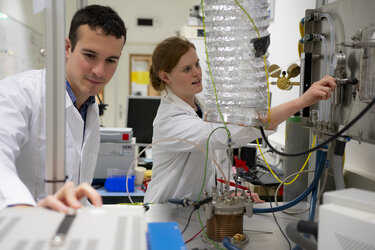Former ESA Research Fellows: Where are they now?
ESA's postdoctoral Research Fellowship Programme offers early-career scientists and engineers the possibility to carry out research in a variety of disciplines related to space science, space applications or space technology. Ahead of the call for applications for the 2023 Space Science Research Fellowship Programme, we are inviting former Research Fellows to share their experience at ESA.
This month we are interviewing Tra-Mi Ho who was an ESA Research Fellow in the Directorate of Science and now is Head of the Department of System Engineering and Project Office at the German Aerospace Center (DLR).

Where and in which role are you working today?
I am working at DLR as Head of the Department of System Engineering and Project Office. The competences of the department are project management, system engineering and assembly, integration and verification (AIV) of several DLR space missions (MASCOT, Eu:Cropis, and ReFEX). In addition, we conduct research on new methods such as model-based system engineering and robotic AIV to develop and build spacecrafts.
What were you doing before joining ESA as Research Fellow? How did you hear about the vacancy for a Research Fellowship at ESA?
I was finishing my PhD thesis at the University of Bern, where my field of research was cometary science. I did an internship at ESA before starting my PhD and so was aware of the other entry-level possibilities at ESA.

What did you work on during your fellowship at ESA? Do you have a most memorable moment from this period?
I performed small body research (observation of comets, data analysis and interpretation) and I supported the ROSETTA Science Operation Team. I have many memorable moments from this period, including observation campaigns in Tenerife or attending the ROSETTA SWT workshops where I met and exchanged with many experts. I am grateful to my former supervisors and colleagues for welcoming me into the team and allowing me to gain these experiences.
Where did your career path lead to after your Research Fellowship?
I took a position as a research associate at the DLR Institute of Space Systems in Bremen. Of course, I had already been exposed to space science during my studies and to mission science operations during my fellowship. This step allowed me to learn more about the actual mission development, a bit like in the TEC Directorate at ESTEC. The interaction with not only scientists but also engineers at ESA was enriching and helped a lot with the challenges that the new position brought.
In fact, a few years after joining DLR, I had the privilege of leading the MASCOT project. We were developing a nano-size lander for JAXA's Hayabusa2 asteroid sample return mission. It basically started from scratch, but ended up landing on a real asteroid (and is resting there as we speak). The experience I gained at ESA helped me to take on this challenge.
What was the most valuable takeaway from your experience at ESA?
How much you can achieve as a team by working together.
Is there something else you would like to tell early career researchers who are planning to apply as Research Fellows with ESA?
An ESA Research Fellowship is one of the best opportunities to gain insight into the design, development and operation of space missions and thus into the entire life cycle of a spacecraft or space mission. Also, because of ESA's international environment, you get to meet so many people from different backgrounds, which broadens your horizons and is a gift for your future career, wherever it takes you.
Call for applications
The Research Fellowships in Space Science represent one of the highlights of the ESA Science Programme. Early career postdoctoral scientists are offered the unique opportunity to carry out advanced research related to the space science areas covered by ESA Science missions at one of three ESA establishments (ESAC, ESTEC or STScI) for a period of up to three years.
Applications for the Space Science Research Fellowships are now open and the deadline to apply is 18 September. More information can be found here.
Life at ESA
ESA is proud to offer its employees a stimulating and inspiring work environment that is complemented by myriad on-site services and facilities that make their ESA experience outside of work equally as rewarding.















 Germany
Germany
 Austria
Austria
 Belgium
Belgium
 Denmark
Denmark
 Spain
Spain
 Estonia
Estonia
 Finland
Finland
 France
France
 Greece
Greece
 Hungary
Hungary
 Ireland
Ireland
 Italy
Italy
 Luxembourg
Luxembourg
 Norway
Norway
 The Netherlands
The Netherlands
 Poland
Poland
 Portugal
Portugal
 Czechia
Czechia
 Romania
Romania
 United Kingdom
United Kingdom
 Slovenia
Slovenia
 Sweden
Sweden
 Switzerland
Switzerland




























